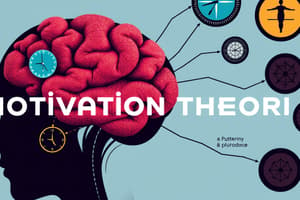Podcast
Questions and Answers
Match the following components of volition with their descriptions:
Match the following components of volition with their descriptions:
Strength of will = Degree of effort needed to achieve a goal Volitional effort = Conscious management of activities Free choice = Making decisions without external constraints Obstacles = Challenges faced in achieving goals
Match the types of obstacles with their definitions:
Match the types of obstacles with their definitions:
External obstacles = Obstacles not dependent on the individual Internal obstacles = Obstacles dependent on personal desires Volitional actions = Conscious efforts to overcome obstacles Unconscious actions = Responses driven by external stimuli
Match the main objectives of volition with their purposes:
Match the main objectives of volition with their purposes:
Overcoming difficulties = Using effort to navigate challenges Making free choices = Choosing actions based on personal values Managing behavior = Controlling one's actions in different contexts Achieving goals = Reaching personal or professional objectives
Match the types of activity in psychology with their characteristics:
Match the types of activity in psychology with their characteristics:
Match the following terms related to activity with their meanings:
Match the following terms related to activity with their meanings:
Match the characteristics of volitional actions with their descriptions:
Match the characteristics of volitional actions with their descriptions:
Match the components of play activity with their features:
Match the components of play activity with their features:
Match the examples of volitional actions with their sources:
Match the examples of volitional actions with their sources:
Match the following terms with their correct definitions:
Match the following terms with their correct definitions:
Match the types of motives with their respective categories:
Match the types of motives with their respective categories:
Match the following psychological concepts with their relevant focus areas:
Match the following psychological concepts with their relevant focus areas:
Match the stages of human development with their corresponding activities:
Match the stages of human development with their corresponding activities:
Match the examples given with their corresponding motive categories:
Match the examples given with their corresponding motive categories:
Match the following psychological aspects to their definitions:
Match the following psychological aspects to their definitions:
Match the following psychological terms with their basic characteristics:
Match the following psychological terms with their basic characteristics:
Match the following categories of motives with their relevant examples:
Match the following categories of motives with their relevant examples:
Flashcards are hidden until you start studying
Study Notes
Will (Volition)
- Will is the mental process that aids in consciously managing activities and overcoming difficulties to achieve goals.
- Strength of will refers to the necessary degree of volitional effort required to accomplish any objective.
- Main objectives of volition include:
- Overcoming obstacles.
- Making free choices in decision-making.
- Managing behavior.
Types of Obstacles
- Obstacles are categorized into:
- External: Not dependent on the individual (e.g., getting late due to bus breakdown).
- Internal: Dependent on personal desires or actions (e.g., oversleeping).
- Actions influenced primarily by external causes lack volitional status, such as fleeing from a dog.
Characteristics of Volitional Actions
- Essential feature of volitional actions is the conscious recognition of the goal's significance.
- Greater importance of a goal results in overcoming more obstacles.
- Volitional actions vary in complexity and awareness.
Activity in Psychology
- Activity is the dynamic interaction of individuals with their environment.
- Human interaction is based on outcomes derived from both inner psychological and outer physical activities.
- Represents an individual's attitude towards the surrounding world.
Main Types of Activity
-
Play:
- A form of activity reflecting one's attitude towards reality.
- Assists in self-discovery and understanding others through the environment.
-
Learning:
- Focuses on acquiring knowledge, skills, and abilities.
- Distinct from play; involves completing tasks, preparation, and discipline, fostering responsibility.
-
Labour:
- Activity aimed at creating tangible and intangible values.
- Foundation of human development, requiring translation of ideas and skills into reality.
Motive
- Defined as a stable psychological cause driving behavior and actions.
- Two primary groups of motives exist:
- Main: Primary reasons for actions.
- Secondary: Additional motivations that may not always be as influential.
- Motives change depending on context and individual perception (e.g., pursuing knowledge vs. social status).
Types of Motives
- Physiological Motives: Basic needs such as hunger and thirst.
- Personal/Social Motives: Include competition, affiliation, and individual goals.
Motivation
- Acts as a guiding factor that energizes human behavior.
- Provides direction and purpose, working at both conscious and unconscious levels.
Studying That Suits You
Use AI to generate personalized quizzes and flashcards to suit your learning preferences.



